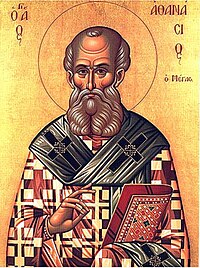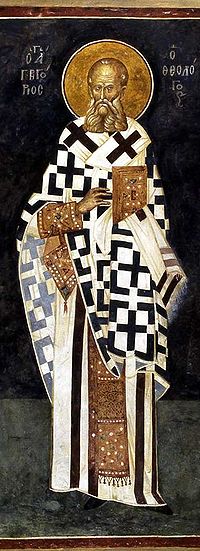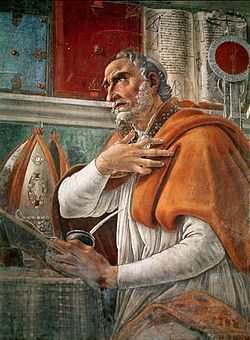
The Chair of Peter by Bernini in the Vatican Basilica -- supported by four figures, four of the eight original doctors of the Church: Sts. Ambrose, Athanasius, John Chrysostom, and Augustine.
[http://www.saintpetersbasilica.org/Altars/Cathedra/Cathedra.htm]
Originally there were 8 great doctors of the Church, four from the Eastern Roman Empire and four from the Western Roman Empire: The Greek Doctors and the Latin Doctors.
Of course, since that time, a couple dozen other individuals of great holiness and significant learning have been added to the list.
This article discusses the idea of the doctor of the Church: Old Catholic Encyclopedia: Doctor of the Church
In days of old, however, the list was much more brief, and I present those doctors here in thumbnail summaries:
GREEK DOCTORS

St. Athanasius (+373AD): The champion of Orthodoxy against the Arian heresy, St. Athanasius was present at the Council of Nicaea in 325, and reigned himself as Patriarch of Alexandria, in Egypt, from 328-373. Of course, he was greatly persecuted and often exiled for his defense of the Divinity of Christ!
[http://www.newadvent.org/cathen/02035a.htm]

St. Basil "the Great" (+379): This Bishop of Caesarea in Cappadocia was a champion and father of Monasticism. He, himself, came from a family of great saints, including St. Gregory of Nyssa. He, too, opposed the error of Arius.
[http://www.newadvent.org/cathen/02330b.htm]

St. Gregory Nazianzen, "the Theologian" (+389): St. Gregory reigned as Patriarch of Constantinople for only a few years, from 379-381. Nevertheless, his theological writings, including poetry, are sublime, both in their profundity and in their orthodoxy. He had been educated with St. Basil.
[http://www.newadvent.org/cathen/07010b.htm]

St. John Chrysostom (+407): St. John, the "golden tongued" was another Patriarch of Constantinople who time in office was rather brief: 398-404AD. His time was one of political persecution, and eventual deposition. Nevertheless, his eloquence in preaching was renowned, and his homilies on Marriage, for instance, have lost none of their relevance.
[http://www.newadvent.org/cathen/08452b.htm]
Those four gentlemen make me want to apply myself to learning the Greek language! At the very least, Greek and Latin Christians alike should be familiar with these four giants of the Faith!
LATIN DOCTORS

St. Ambrose (+397AD): The Bishop of Milan from 374-397, St. Ambrose was an administrator elevated to that post while still a catechumen. He is notable for his contribution to liturgy (the Ambrosian Rite), the political world (rebuking the Emperor Theodosius), as well as for his splendid writings and oratory.
[http://www.newadvent.org/cathen/01383c.htm]

St. Jerome (+420): This irascible doctor is most famous for his translation of the Sacred Scriptures into Latin -- the Latin Vulgate. A native of Dalmatia, he spent time both in Rome, working for Pope St. Damasus, in the wilderness of Syria, and ended his life in Bethlehem.
[http://www.newadvent.org/cathen/08341a.htm]

St. Augustine (+430): The Bishop of Hippo in North Africa, St. Augustine is probably the most famous of the Latin Doctors. Certainly his Confessions and City of God stand out of an almost incredible number of writings. He was received into the Church by St. Ambrose, and had some rather amusing correspondence with St. Jerome! For the Latin Church, he is most certainly the most influential of the early Doctors, and his contribution is hard to overestimate.
[http://www.newadvent.org/cathen/02084a.htm]

Pope St. Gregory "the Great" (+604): This "doctor of desire" was Bishop of Rome from 590-604AD and is famous for a host of accomplishments from Gregorian Chant to sending St. Augustine of Canterbury to convert England to his great Pastoral Rule. [http://www.newadvent.org/cathen/06780a.htm]
Greek and Latin, both, should know and revere these four Doctors as well -- for Latins, in particular, we must know the well from which St. Thomas Aquinas drew!
Thus, if you seek excellent summer reading, perhaps you might look back to the original doctors!
If you wish to read some of their work, you might check here: http://www.newadvent.org/fathers/
Live well!
No comments:
Post a Comment